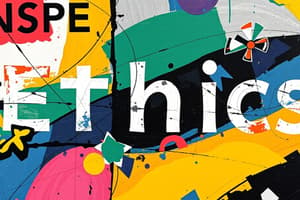Podcast
Questions and Answers
Engineers, in the fulfillment of their professional duties, must carefully consider the safety, health, and welfare of the public.
Engineers, in the fulfillment of their professional duties, must carefully consider the safety, health, and welfare of the public.
False (B)
Engineers may perform services outside of their areas of competence as long as they inform their employers or clients.
Engineers may perform services outside of their areas of competence as long as they inform their employers or clients.
False (B)
Engineers may issue subjective and partial statements if such statements are in writing and consistent with the best interests of their employers, clients, or the public.
Engineers may issue subjective and partial statements if such statements are in writing and consistent with the best interests of their employers, clients, or the public.
False (B)
Engineers shall act for each employer or client as faithful agents or trustees.
Engineers shall act for each employer or client as faithful agents or trustees.
Engineers shall not be required to engage in truthful acts when required to protect the public health, safety, and welfare.
Engineers shall not be required to engage in truthful acts when required to protect the public health, safety, and welfare.
Engineers may not be required to follow the provisions of state or federal law when such actions could endanger or compromise their employer or their clients' interests.
Engineers may not be required to follow the provisions of state or federal law when such actions could endanger or compromise their employer or their clients' interests.
If engineers' judgment is overruled under circumstances that endanger life or property, they shall notify their employers or clients and such other authority as may be appropriate.
If engineers' judgment is overruled under circumstances that endanger life or property, they shall notify their employers or clients and such other authority as may be appropriate.
Engineers may review but shall not approve those engineering documents that are in conformity with applicable standards.
Engineers may review but shall not approve those engineering documents that are in conformity with applicable standards.
Engineers shall not reveal facts, data...information without the prior consent of the client or employer except as authorized or required by law or this Code.
Engineers shall not reveal facts, data...information without the prior consent of the client or employer except as authorized or required by law or this Code.
Engineers shall not permit the use of their names or associates in business ventures with any person or firm that they believe is engaged in fraudulent or dishonest enterprise, unless such enterprise or activity is deemed consistent with applicable state or federal law.
Engineers shall not permit the use of their names or associates in business ventures with any person or firm that they believe is engaged in fraudulent or dishonest enterprise, unless such enterprise or activity is deemed consistent with applicable state or federal law.
Engineers having knowledge of any alleged violation of this Code, following a period of 30 days during which the violation is not corrected, shall report thereon to appropriate professional bodies and, when relevant, also to public authorities, and cooperate with the proper authorities in furnishing such information or assistance as may be required.
Engineers having knowledge of any alleged violation of this Code, following a period of 30 days during which the violation is not corrected, shall report thereon to appropriate professional bodies and, when relevant, also to public authorities, and cooperate with the proper authorities in furnishing such information or assistance as may be required.
Engineers shall undertake assignments only when qualified by education or experience in the specific technical fields involved.
Engineers shall undertake assignments only when qualified by education or experience in the specific technical fields involved.
Engineers shall not affix their signatures to plans or documents dealing with subject matter in which they lack competence, but may affix their signatures to plans or documents not prepared under their direction and control where they have a good faith belief that such plans or documents were competently prepared by another designated party.
Engineers shall not affix their signatures to plans or documents dealing with subject matter in which they lack competence, but may affix their signatures to plans or documents not prepared under their direction and control where they have a good faith belief that such plans or documents were competently prepared by another designated party.
Engineers may accept assignments and assume responsibility for coordination of an entire project and shall sign and seal the engineering documents for the entire project, including each technical segment of the plans and documents.
Engineers may accept assignments and assume responsibility for coordination of an entire project and shall sign and seal the engineering documents for the entire project, including each technical segment of the plans and documents.
Engineers shall strive to be objective and truthful in professional reports, statements or testimony, with primary consideration for the best interests of the engineers' clients or employers. The engineers' reports shall include all relevant and pertinent information in such reports, statements, or testimony, which shall bear the date on which the engineers were retained by the clients to prepare the reports.
Engineers shall strive to be objective and truthful in professional reports, statements or testimony, with primary consideration for the best interests of the engineers' clients or employers. The engineers' reports shall include all relevant and pertinent information in such reports, statements, or testimony, which shall bear the date on which the engineers were retained by the clients to prepare the reports.
Engineers may express publicly technical opinions that are founded upon knowledge of the facts and competence in the subject matter.
Engineers may express publicly technical opinions that are founded upon knowledge of the facts and competence in the subject matter.
Engineers shall not issue statements, criticisms, or arguments on technical matters that are inspired or paid for by interested parties, unless they have prefaced their comments by explicitly identifying the interested parties on whose behalf they are speaking and revealing the existence of any interest the engineers may have in the matters.
Engineers shall not issue statements, criticisms, or arguments on technical matters that are inspired or paid for by interested parties, unless they have prefaced their comments by explicitly identifying the interested parties on whose behalf they are speaking and revealing the existence of any interest the engineers may have in the matters.
Engineers may not participate in any matter involving a conflict of interest if it could influence or appear to influence their judgment or the quality of their services.
Engineers may not participate in any matter involving a conflict of interest if it could influence or appear to influence their judgment or the quality of their services.
Engineers shall not accept compensation, financial or otherwise, from more than one party for services on the same project, or for services pertaining to the same project, unless the circumstances are fully disclosed and agreed to by all interested parties.
Engineers shall not accept compensation, financial or otherwise, from more than one party for services on the same project, or for services pertaining to the same project, unless the circumstances are fully disclosed and agreed to by all interested parties.
Flashcards are hidden until you start studying
Study Notes
NSPE Code of Ethics Overview
- Engineers prioritize public safety, health, and welfare in their professional duties.
- Performing services beyond competence requires informing employers or clients.
- Engineers must avoid issuing subjective statements that could conflict with ethical standards.
- A duty of loyalty exists where engineers act as faithful agents or trustees for clients and employers.
Professional Conduct
- Ethical behavior includes engaging in truthful actions to protect public welfare.
- Compliance with state and federal law is mandatory, even if it may conflict with clients’ interests.
- Engineers should notify employers or clients if their judgments are overruled in life-endangering situations.
Confidentiality and Disclosure
- Maintaining confidentiality of client information is essential, except when legally required or authorized.
- Engineers must refrain from supporting or being involved with entities suspected of fraudulent activities.
Reporting Violations
- Knowledge of ethical violations must be reported to professional bodies after a grace period for rectification.
- Assignments should only be accepted when engineers possess relevant qualifications or experience.
Competence and Responsibility
- Engineers cannot sign documents outside their competence unless they reasonably believe in the competence of other parties.
- Accepting and coordinating project assignments is allowed only when engineers are qualified.
Ethical Expression
- Publicly expressing technical opinions must be grounded in fact and expertise.
- Transparency regarding any interest in a matter is required when making technical statements on behalf of others.
Financial Ethics
- Engineers must avoid conflicts of interest that might affect their judgment or service quality.
- Accepting multiple compensations from different parties for the same project is prohibited unless disclosed and agreed upon by all parties involved.
Studying That Suits You
Use AI to generate personalized quizzes and flashcards to suit your learning preferences.




